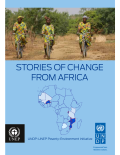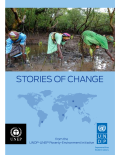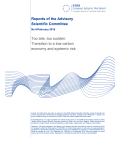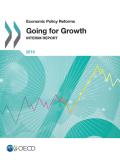

This publication brings together selected Stories of Change which we will hopefully catalyze and motivate governments, stakeholders, and the international development community at large to invest in, and support, poverty-environment mainstreaming across the globe as one element of the transition to an inclusive, green economy. Poverty-environment mainstreaming is a compelling and effective approach and set of tools and capacities for driving the institutional change which can –and ultimately will - deliver sustainable development.
These Stories of Change showcase that innovative and flexible ways of working can be the norm rather than the exception.
The booklet includes the following chapters:
This study explores how the proposed activities by the Congo Basin countries to reduce drivers of land emissions from deforestation and forest degradation (REDD+) could support the transition to a green economy and low carbon development future. By employing a content review and analysis of national REDD+ strategies and REDD+ readiness proposals submitted to the Forest Carbon Partnership Facility, the researchers found out that many of the proposed REDD+ activities by the Congo Basin countries including: climate smart agricultural practices and certification of large scale agricultural plantations; establishment of wood fuel energy plantations and improvement in energy efficiency; forests certification and implementation of the VPA-FLEGT; land use planning and zoning of mined sites; and the implementation of construction projects in low forested areas aligns with several green economy sectorial programmes of the Economic Community of Central African States (ECCAS).

Keeping global warming below 2°C will require substantial reductions in global greenhouse gas emissions over the next few decades.
This report highlights that leaving the transition to a low-carbon economy too late risks affecting the economy of the European Union in three ways:
- first, a sudden transition away from fossil-fuel energy could harm GDP, as alternative sources of energy would be restricted in supply and more expensive at the margin;
- second, there could be a sudden repricing of carbon-intensive assets, which are financed in large part by debt;
- third, there could be a concomitant rise in the incidence of natural catastrophes related to climate change, raising general insurers’ and reinsurers’ liabilities.
A gradual transition to a low-carbon economy is therefore seen as the best option; this choice would be better manageable and would prevent energy costs from rising abruptly. Furthermore, additional policy intervention and investments in low-carbon technology are likely to help in preventing greenhouse gases in the atmosphere from growing in the medium term.

Going for Growth is the OECD’s regular report on structural reforms in policy areas that have been identified as priorities to boost incomes in OECD and selected non-OECD countries (Brazil, China, Colombia, India, Indonesia, Latvia, Russian Federation and South Africa). Policy priorities are updated every two years and presented in a full report, which includes individual country notes with detailed policy recommendations to address the priorities.The next full report will be published in 2017.
This interim report takes stock of the actions taken by governments over the past two years in the policy areas identified as priorities for growth. This stocktaking is supported by internationally comparable indicators that enable countries to assess their economic performance and structural policies in a wide range of areas.
